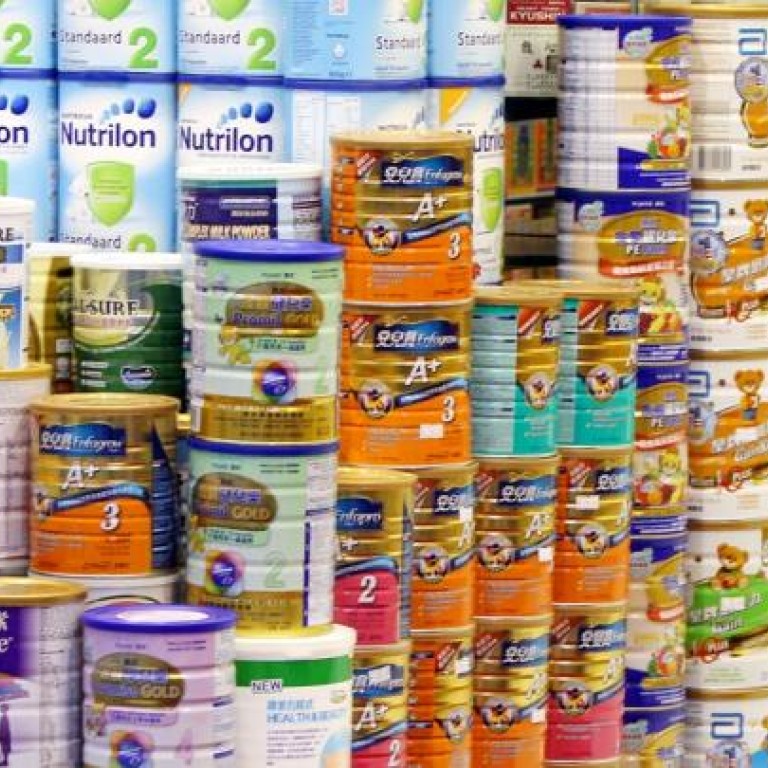
Officials taking the wrong approach to resolve infant formula shortage
Albert Cheng says instead of putting controls on the export of milk powder, the government should supply it for free to local parents
As the saying goes, "Those whom the gods wish to destroy they first make mad". This applies to the way Chief Executive Leung Chun-ying and his administration are handling the latest scandal involving one of his formerly staunch supporters, Lew Mon-hung. His government is attempting to ride out the scandal by diverting attention to the shortage of infant formula. But it won't work.
Leung and his top officials, such as Chief Secretary Carrie Lam Cheng Yuet-ngor, Secretary for Food and Health Ko Wing-man and Secretary for Commerce and Economic Development Greg So Kam-leung are all putting on a show. Let's look at their shoddy diversion tactics.
On January 23, following a meeting with health officials, baby formula suppliers stressed there was adequate supply for locals while retailers said they would limit each purchase to four cans.
On January 25, Ko called a second meeting with suppliers. After the session, suppliers again reassured the city of their commitment to ensure adequate supply. Ko once again held off taking action and said the government would monitor the situation. The next day, the only so-called measure introduced was the setting up of an inquiry hotline for the public.
Then, on January 27, the one-man show by Ko continued. This time, he said that although the government would not rule out taking more severe measures, it was worried that they could have negative effects.
Elaborating on his policy address on RTHK's programme, Leung took the credit for being the main advocate of the individual visit scheme that allows residents of more affluent mainland cities to come to Hong Kong as tourists without having to join tour groups. He said that, because of this measure, the mainland has now become Hong Kong's biggest source of tourism income. But, of course, he did not mention how some of these travellers are buying up infant formula here, causing a severe supply shortage for locals.
On Tuesday, Leung ignored Lew's allegations and addressed the baby formula problem; he pledged the government's support to resolve the issue by setting up an interdepartmental working group.
The commerce department then joined in the chorus, with So saying that the government would review and assess the situation.
The government then finally said it was considering action, such as whether to make infant formula a reserved commodity, which means setting a price ceiling and restricting its exports. This may mean limiting sales to two to three cans per traveller.
The problem is in fact not difficult to resolve. Hong Kong could learn from other governments that help pay for the costs of raising a child. For example, the government could supply each local infant five to six cans of baby formula each month for three years. The distribution could be handled by maternal and child health centres.
Let's be clear, though: parallel trading is not illegal. In fact, it is a legitimate and common economic activity the world over. This practice exists due to the difference in taxes imposed on the same commodities in two areas. Hong Kong people are actively involved in parallel importation, bringing goods in from Japan years ago. Now the popular destination is South Korea. Many small fashion boutiques rely on this trading practice to survive.
It's understandable why so many drug stores near the border in Sheung Shui and Fanling are hoarding products such as infant formula and selling them to mainlanders in mass quantities. It's no different from the way our property market works.
Moreover, the majority of people involved in the parallel trading of baby formula are Hongkongers. This kind of economic activity does help to stimulate the economy. Imposing restrictive measures will bring no positive outcome.
The idea of making baby formula a reserved commodity is naive. The Reserved Commodities Ordinance is outdated, and rice, a staple food in Hong Kong, is the only food product scheduled as a reserved commodity under the related regulation.
Hong Kong's success relies on being a free port that thrives on free trade and its open-door policy. Controlling the import and export of certain products such as baby formula would risk making Hong Kong an international laughing stock.
There are many solutions available - the only problem is that the government is incompetent and the mainland's customs officers are too lax.
Leung would do well to draw inspiration from our national leader Xi Jinping, who said that as long as our spirit remains unbroken, there will always be more solutions than problems. The problem is, our chief executive seems more interested in keeping his own power intact.

